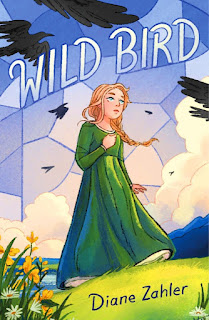Diane Zahler is the author of the new middle grade historical novel Wild Bird. Her other books include the middle grade novel Goblin Market. She lives in the Hudson Valley.
Q: What inspired you to write Wild Bird, and how did you create your character Rype?
A: I've been obsessed with the bubonic plague since I was a kid. The first research paper I ever wrote, in middle school, was on the plague! I was a medieval history major in college.
In 2009, I wrote a nonfiction book for a Lerner Books series called Pivotal Moments in History titled The Black Death. When I was researching it, I came across a story about a village in Norway where everyone died of plague -- except for one young girl. When she was discovered, she was so traumatized that she couldn't speak. The people who found her called her Rype, or wild bird.
Once I'd read about her, I had to write about her. To create her character I did some research on trauma and tried to imagine what that kind of nightmare might be like for a young person -- and in particular, a young person in 1350. It wasn't such a stretch. Young people today are suffering similar traumas caused by loss from Covid, by war, by living as refugees. Their stories are all around us.
Q: The writer Laurel Snyder called the book "A deeply moving tribute to the power of art and memory." What do you think of that description?
A: I can't express what that statement meant to me. Laurel so completely got what I was trying to do in the book.
Rype, my main character, becomes a trobairitz, a singer/songwriter, who tries to preserve and celebrate in her music her memories of those whom she's loved and lost. Through her art, she finds a way to cope with her trauma, and as she is able gradually to remember her life before and during the plague -- both the wonderful moments and the terrible ones -- she becomes a better musician and a stronger, more compassionate person.
Q: How did you research the novel, and what did you learn that especially surprised you?
A: I had done a lot of the necessary research when I was writing The Black Death, but in historical fiction, there's always more to know. How did people dress? What did they eat? What were their houses like? The way I work is simply to write, and when I come to a place where I need more information, I dive into the Internet or a library.
As for surprising facts -- oh, there were so many! People in the 1300s had no idea how disease spread. They blamed it on bad air, on astrological conjunctions, on sin, on witches, on Jewish people (though the pope, Clement VI, issued a papal bull exonerating Jews from responsibility, which was very broad-minded for a medieval pope). They treated it with herbs, with tonics, with dried toads, with bleeding and cupping, with self-flagellation.
But the most shocking fact was the sheer number who perished. Though no one can make a truly accurate count, historians believe that between one-third and two-thirds of the population of Europe died. It's unfathomable. And it changed everything, from religion to education to the class system.
Q: I also wanted to ask you about your previous novel, Goblin Market. Why did you decide to write that book, and how would you describe the dynamic between your characters Lizzie and Minka?
A: I've always loved the poem "Goblin Market" by Christina Rossetti, and for years the idea of reworking it for middle-grade readers knocked around in my head.
Once I started, I found it really challenging -- the poem, of course, is intended primarily for adults, and there are many themes that run through it that might not work for young readers. I tried to keep in as much as I could; I hope Ms. Rossetti would approve.
In my book, Lizzie is neurodivergent, and Minka, her older sister, has always taken care of her. But once Minka is enchanted by goblins, the two girls reverse roles, and Lizzie is forced to confront her fears in an effort to save her sister.
Q: What are you working on now?
A: I'm focusing on historical fiction right now. I have a completed manuscript and am half-finished with another, both set in Europe in the distant past. Everything else about them, of course, is top secret, so that's all I can tell you!
Q: Anything else we should know?
A: I actually finished Wild Bird right as Covid began. It was strange and horrifying to see the similarities between the two pandemics. Yes, we now know what viruses and bacteria are and how they're transmitted. Nevertheless, some people reacted with the same senseless fear and bigotry that people in the 14th century did.
When Laurel Snyder said in her blurb that she felt "a little more hope for the future" after reading my book, a weight lifted from me. I'd done at least part of what I set out to do: show that it's possible, even in the hardest of times, to live in a way that isn't controlled by ignorance and fear.
--Interview with Deborah Kalb. Here's a previous Q&A with Diane Zahler.



No comments:
Post a Comment